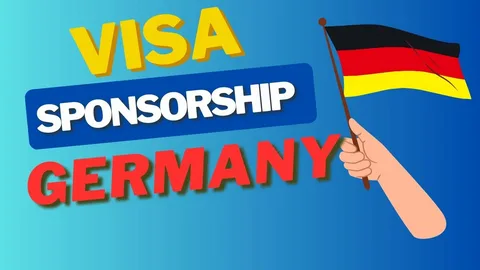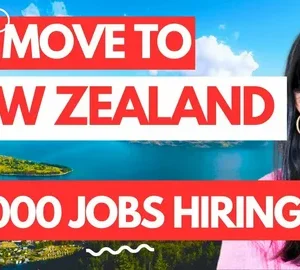Introduction: Why Everyone is Talking About Visa Sponsored Jobs in Germany
Imagine waking up in Berlin, grabbing a hot coffee from a cozy German bakery, and heading to your dream job at a tech firm or hospital—all while knowing your employer helped you move there. That’s the reality of visa sponsored jobs in Germany, and it’s why thousands of international workers are now packing their bags.
Germany is more than just castles, Oktoberfest, and Mercedes-Benz. It’s the beating heart of Europe’s economy and a magnet for skilled workers worldwide. The country’s aging population and rapid technological growth have created a massive demand for nurses, engineers, IT experts, and skilled tradespeople. This demand is so high that many employers are ready to sponsor your visa, easing your entry into the country.
What makes this topic exciting is that visa sponsorship isn’t just a job offer—it’s a lifeline. It covers the complex paperwork, helps you relocate, and in many cases, even supports your family’s move. Think of it as a bridge between your career dreams and Germany’s thriving job market.
By the end of this guide, you’ll know not only how to find visa sponsored jobs in Germany, but also how to navigate the application process, understand the salary structure, and make informed decisions about relocation. So, if you’re ready to turn your European dream into a reality, let’s dive in.

Why Germany is a Top Destination for International Workers
When people think of moving abroad, Germany often lands in their top three choices—and for good reason. Beyond its rich history and vibrant culture, Germany offers stability, financial security, and a high quality of life. But let’s break it down:
1. Economic Powerhouse
Germany has the largest economy in Europe and the fourth largest globally. It’s home to global giants like Siemens, BMW, SAP, and Volkswagen, and it continues to expand in fields like renewable energy, healthcare, and AI. This economic strength means companies can afford competitive salaries and are willing to invest in international talent.
2. Worker-Friendly Laws
Germany is known for protecting workers’ rights. Standard working hours are capped at 40 per week, and overtime is heavily regulated. Employees enjoy at least 20 days of paid leave, with many companies offering 25–30 days. Compare that to some countries where vacation is a luxury, and you can see why Germany is appealing.
3. Social Security and Benefits
When you work in Germany, you automatically contribute to social security systems that cover healthcare, unemployment benefits, and pensions. It’s like buying peace of mind along with your paycheck.
4. Pathway to Permanent Residency
Many international workers are not just looking for a job—they’re looking for stability. With visa sponsorship, you’re not just filling a temporary gap; you’re opening the door to permanent residency, and eventually, even citizenship.
5. Prime Location
Living in Germany means you’re a train ride away from Paris, Amsterdam, or Vienna. For travel enthusiasts, it’s a dream come true.
👉 Check Germany’s official job market info here.
What Are Visa Sponsored Jobs in Germany?
Before we go further, let’s clear up what “visa sponsored jobs” really mean. A lot of people confuse them with “just getting a job abroad,” but there’s a key difference.
Visa sponsored jobs are employment opportunities where the company itself supports your visa application. In practice, this means:
-
The employer provides you with an official job offer letter.
-
They assist in proving to immigration that your role couldn’t be easily filled by a local candidate.
-
In many cases, they provide documents, sometimes cover fees, and even offer relocation assistance like housing or flight tickets.
The Two Main Visa Options
-
German Work Visa (Residence Permit):
For skilled workers who have a confirmed job offer. You don’t necessarily need to meet high salary thresholds; what matters is your skills and employer demand. -
EU Blue Card:
Designed for highly qualified professionals with a university degree and specific salary levels. Currently, the salary requirement is about €45,300 per year (lower at around €39,682 for shortage occupations like engineers and IT specialists).
Think of the German Work Visa as your open doorway, and the EU Blue Card as your VIP pass with added mobility across EU countries.
👉 Learn about the EU Blue Card.
Industries Offering Visa Sponsorship in Germany
Germany isn’t just hiring randomly—it has specific industries facing acute labor shortages. If your skills fall into these categories, you’re in luck because employers are actively searching for international workers and offering visa sponsorship.
1. Healthcare and Nursing
Germany’s healthcare sector is under pressure due to its aging population. Hospitals, elderly care facilities, and private clinics constantly need nurses, caregivers, and doctors. The shortage is so severe that many hospitals are willing to cover relocation costs, language training, and visa processing for foreign staff.
-
Nurses from countries like the Philippines, India, and Nigeria are highly sought after.
-
Salaries range from €2,800 to €4,500 monthly depending on qualifications.
-
Some programs even allow you to start working while completing your German language proficiency exams.
👉 Apply for Nursing Jobs in Germany
2. Engineering
If you’re an engineer, Germany is basically your playground. From automotive to mechanical and civil engineering, there’s a massive skills gap. The country is home to car manufacturers like BMW, Audi, and Mercedes-Benz, and they’re eager to attract top talent.
-
Civil engineers are needed for massive infrastructure projects.
-
Electrical and mechanical engineers are key in manufacturing and renewable energy industries.
-
With visa sponsorship, you could end up working on projects that shape the future of Europe’s infrastructure.
👉 Explore Engineering Jobs on EURES
3. Information Technology (IT)
If you’re in tech, your chances are even brighter. Germany is rapidly expanding its digital economy and needs software developers, cybersecurity specialists, AI engineers, and data analysts. Many German companies, especially startups in Berlin, Hamburg, and Munich, hire in English, making the transition easier.
-
Average salaries range from €4,500 to €7,000 monthly.
-
Tech firms often provide relocation packages, including flights, housing assistance, and German lessons.
-
Companies like SAP, Zalando, and Bosch are among the top employers.
👉 Apply for IT Jobs in Germany
4. Manufacturing and Skilled Trades
Germany is often called the “workshop of Europe”, and it’s true. Skilled tradespeople like electricians, plumbers, welders, and machine operators are essential to keep its industries running. Unlike IT or engineering jobs, you don’t always need a university degree here—experience and certification can land you sponsorship.
-
Wages range from €2,500 to €4,000 monthly.
-
Many employers also support you in getting professional recognition for your skills in Germany.
5. Education and Research
Germany is a hub for innovation, and universities frequently sponsor international researchers and academics. If you hold a PhD or are pursuing one, you’ll find opportunities in scientific research, teaching, and fellowships. The government actively funds these positions through programs like DAAD.
👉 DAAD Research Jobs in Germany
Top Cities in Germany for Sponsored Jobs
Now that you know the industries, let’s look at where the action happens. Germany’s job opportunities aren’t spread evenly across the country—some cities stand out more than others.
Berlin
The capital is buzzing with startups, IT firms, and creative industries. It’s also the most international city, where English is widely accepted in workplaces. If you’re into tech or media, Berlin should be at the top of your list.
Munich
Munich is the wealth hub of Germany. It’s known for high-paying jobs in finance, engineering, and automotive industries. The cost of living is higher, but so are the salaries.
Frankfurt
If you’re into banking, finance, or international trade, Frankfurt is the European hub. It’s home to the European Central Bank and countless multinational firms.
Hamburg
Known for its port and logistics industry, Hamburg is perfect for professionals in shipping, supply chain, and trade. It’s also a hub for media and creative jobs.
Stuttgart
This is automobile central. Mercedes-Benz and Porsche both have headquarters here, making it ideal for engineers and technicians.
👉 Find Jobs by City on StepStone
Visa Requirements for Sponsored Jobs in Germany
Before you pack your bags, you’ll need to meet certain requirements. While each visa type has specifics, here are the general requirements:
-
Valid Job Offer – You must have an official job contract from a German employer willing to sponsor your visa.
-
Proof of Qualifications – Degrees, certificates, and work experience documents are needed. Non-EU qualifications may require recognition in Germany.
-
Salary Thresholds – For the EU Blue Card, the minimum is €45,300 annually, or €39,682 for shortage occupations (like engineers, IT, or doctors).
-
Health Insurance – Mandatory in Germany. You’ll need to show proof before your visa is approved.
-
Application Forms and Passport – Standard paperwork submitted at your local German consulate or embassy.
👉 Check Germany Work Visa Requirements
Pro Tip: Employers often help with the paperwork, making your life easier. That’s why visa sponsorship is such a big deal—it removes the hardest barrier for most foreign workers.
How to Apply for Visa Sponsored Jobs in Germany
Landing a sponsored job in Germany isn’t as complicated as it seems if you follow the right steps. Here’s your roadmap:
-
Search on Trusted Job Portals
Use official websites to avoid scams: -
Tailor Your CV and Cover Letter
German employers expect concise, structured CVs (often no more than 2 pages). Highlight your skills, certifications, and language abilities. -
Prepare for Interviews
Many interviews are online first. Be ready for cultural differences—German employers value punctuality, honesty, and precision. -
Employer Provides Sponsorship Documents
Once selected, the company sends you documents proving your employment. -
Apply for Your Visa
Submit your paperwork at the German Embassy or Consulate in your country. The process usually takes 6–12 weeks.
Salary Expectations for Visa Sponsored Jobs in Germany
One of the first questions on any job seeker’s mind is: “How much will I earn?” The good news is that salaries in Germany are competitive, stable, and backed by strong labor laws. While earnings vary based on industry, city, and experience, most visa sponsored jobs pay above-average wages compared to many countries.
Here’s a breakdown of average monthly salaries (before tax):
| Industry | Average Salary (EUR/Month) | Sponsorship Likelihood |
|---|---|---|
| Healthcare & Nursing | €2,800 – €4,500 | Very High |
| Engineering | €4,000 – €6,500 | High |
| IT & Software | €4,500 – €7,000 | Very High |
| Manufacturing/Trades | €2,500 – €4,000 | Moderate to High |
| Education/Research | €3,500 – €6,000 | High |
A nurse in Berlin, for instance, might start at €2,900/month, while a software developer in Munich can earn over €6,000/month. Of course, Munich salaries are higher partly because the cost of living is higher there.
Employers sponsoring your visa often include extra perks: relocation bonuses, housing support, and sometimes even German language courses. This makes the total package more attractive than just the salary alone.
👉 Check salary ranges by job in Germany
So, when applying, don’t just look at the gross salary—ask what benefits are included. A job with a lower salary but full relocation support may actually be better than a higher-paying one without perks.
Benefits of Visa Sponsored Jobs in Germany
The real magic of visa sponsorship is not just the paycheck—it’s the extras that make your transition smoother. Think of it like a welcome mat Germany rolls out for you.
1. Simplified Paperwork
Visa applications can be confusing, but with employer sponsorship, much of the heavy lifting is done by the HR department. They provide the documents proving that your job is legitimate and often liaise directly with immigration offices.
2. Relocation Assistance
Many companies understand the challenges of moving abroad. They may pay for your flight tickets, help you secure temporary housing, or even cover part of your rent for the first few months.
3. Family Inclusion
If you’re married or have kids, visa sponsorship often extends to your dependents. That means your spouse can move with you, and children can access Germany’s excellent free education system.
4. Career Growth and Security
Sponsored workers are highly valued since companies invest in bringing them over. This often translates into better job security, training opportunities, and career progression.
5. Path to Permanent Residency
After working in Germany for a few years (typically 33 months on an EU Blue Card, or 21 months with good German language skills), you can apply for permanent residency. That’s stability most countries don’t offer so quickly.
👉 See Germany’s official Blue Card benefits
Challenges of Getting Visa Sponsored Jobs in Germany
It’s not all sunshine and rainbows—moving to Germany comes with its own hurdles. Being aware of them helps you prepare better.
1. Language Barrier
Yes, many IT and engineering jobs are in English. But daily life—groceries, doctors, bureaucracy—requires at least basic German. Without it, you may feel isolated. Employers may sponsor jobs, but learning German is still your responsibility.
2. Cultural Adjustment
German work culture is structured and punctual. Meetings start on time, processes are precise, and communication is straightforward. For some, this is refreshing; for others, it can feel rigid.
3. Bureaucracy
Germany is famous for paperwork. From registering your address (Anmeldung) to getting a tax ID, expect forms and waiting times. Even with visa sponsorship, you’ll face administrative hurdles.
4. Competition
Visa sponsorship is attractive, which means many applicants. To stand out, you’ll need a tailored CV, strong qualifications, and ideally some German skills.
5. Cost of Living in Major Cities
Munich, Frankfurt, and Hamburg can be expensive. Rent alone can take up 40–50% of your salary. While sponsorship may cover part of your relocation, planning financially is essential.
👉 Check cost of living by German city
Tips to Secure a Visa Sponsored Job in Germany
Landing a sponsored job is competitive, but with the right strategy, you can beat the odds. Think of it like a marathon—you’ll need persistence, preparation, and patience.
1. Learn Basic German
Even if your job doesn’t require it, employers prefer candidates who show commitment. Learning German basics (A2/B1 level) makes you far more attractive.
2. Tailor Your CV for German Standards
German CVs are usually 2 pages maximum, include a professional photo, and are structured clearly (education, work experience, skills). Avoid flashy designs—clarity matters more.
3. Apply on the Right Platforms
Focus on legitimate job portals where sponsorship is common:
4. Network with Professionals in Germany
Join LinkedIn groups, attend virtual job fairs, and connect with German recruiters. Networking can open doors faster than cold applications.
5. Prepare for Cultural Questions in Interviews
German employers value honesty, punctuality, and direct communication. Practice answering questions clearly and avoid over-promising.
6. Be Patient with the Process
Even after landing a job, visa processing can take 2–3 months. Plan accordingly and don’t quit your current job too soon.
Conclusion: Your Pathway to a Career in Germany
Visa sponsored jobs in Germany are more than just employment—they are a gateway to a new life in one of the world’s strongest economies. Whether you’re a nurse looking for stability, an IT expert craving innovation, or an engineer ready to design the future, Germany offers both career growth and personal security.
What sets these opportunities apart is the employer support: from handling visa paperwork to covering relocation costs, German companies make the process smoother for international professionals. And with benefits like free education for your children, health coverage, and the pathway to permanent residency, you’re not just moving for a job—you’re investing in your future.
Of course, challenges exist: language barriers, cultural differences, and bureaucracy. But with preparation—learning German, tailoring your CV, and applying through trusted platforms—you can overcome them.
If you’ve been waiting for the right time, this is it. Germany is actively calling for foreign professionals, and visa sponsorship is your ticket in. The door is wide open—step through it.
👉 Start your journey today:
FAQs About Visa Sponsored Jobs in Germany
1. Do I need to know German to get a visa sponsored job in Germany?
Not always—but it depends on the industry. For IT and engineering jobs, many companies operate in English, especially in international hubs like Berlin or Munich. However, for healthcare, nursing, and customer-facing roles, German proficiency is often mandatory. Even if you land an English-speaking job, daily life in Germany—shopping, doctors, and bureaucracy—will require at least basic German skills. That’s why most employers encourage or even pay for language courses. By showing initiative in learning German (A2 or B1 level), you make yourself a stronger candidate. Long term, speaking German also speeds up your pathway to permanent residency.
2. How long does the visa process take once I get a sponsored job?
The average processing time for a German work visa is between 6 to 12 weeks. However, this timeline depends on your home country, the completeness of your application, and how quickly your employer provides the required documents. For shortage occupations like nurses and IT specialists, the process can sometimes be expedited. While waiting, you’ll usually need to:
-
Submit your job contract and employer sponsorship letter.
-
Show proof of health insurance.
-
Provide academic or professional qualification recognition if required.
Pro tip: Don’t resign from your current job until your visa is approved. Employers understand the waiting period, and most are patient during the transition.
3. Can my family join me if I secure a sponsored job in Germany?
Yes—this is one of the biggest advantages of visa sponsorship. If you’re married or have children, your dependents can apply for a family reunification visa. Spouses are even allowed to work in Germany, and children have access to world-class free education. Many employers go the extra mile by helping families with relocation—arranging housing, school registrations, or even offering childcare benefits. The German system is designed to make integration easier, so moving as a family is not only possible but encouraged.
4. What’s the difference between a German Work Visa and an EU Blue Card?
Both allow you to live and work in Germany, but they cater to different groups. The German Work Visa is open to all skilled professionals with a valid job offer, regardless of salary level (though the job must meet Germany’s labor market needs). The EU Blue Card, however, is aimed at highly qualified professionals with a university degree and a salary above a certain threshold (about €45,300 annually, or €39,682 for shortage jobs like IT and engineering). The key advantage of the Blue Card is mobility—you can more easily move between EU countries and apply for permanent residency faster (21 months with good German language skills). If your salary qualifies, the EU Blue Card is usually the better choice.
5. Can visa sponsored jobs in Germany lead to permanent residency or citizenship?
Yes, and this is what makes Germany so attractive. Sponsored workers on a German Work Visa or EU Blue Card can apply for permanent residency after a few years. Specifically, EU Blue Card holders can get permanent residency after 33 months, or just 21 months if they have B1-level German proficiency. From there, citizenship becomes possible after 8 years of legal residence, or 7 years with proven integration (like language and cultural knowledge). This means your sponsored job isn’t just short-term employment—it’s a direct pathway to building a life in Germany long term.




